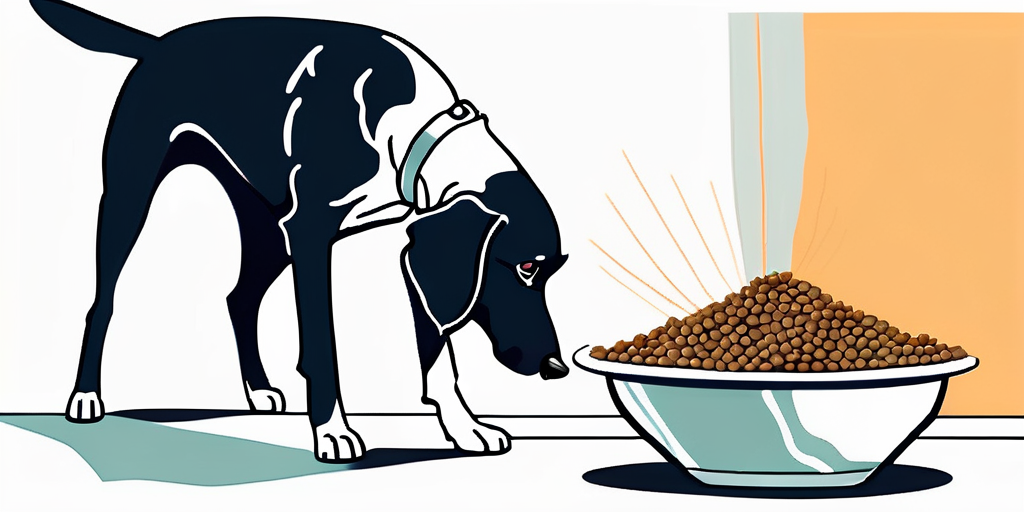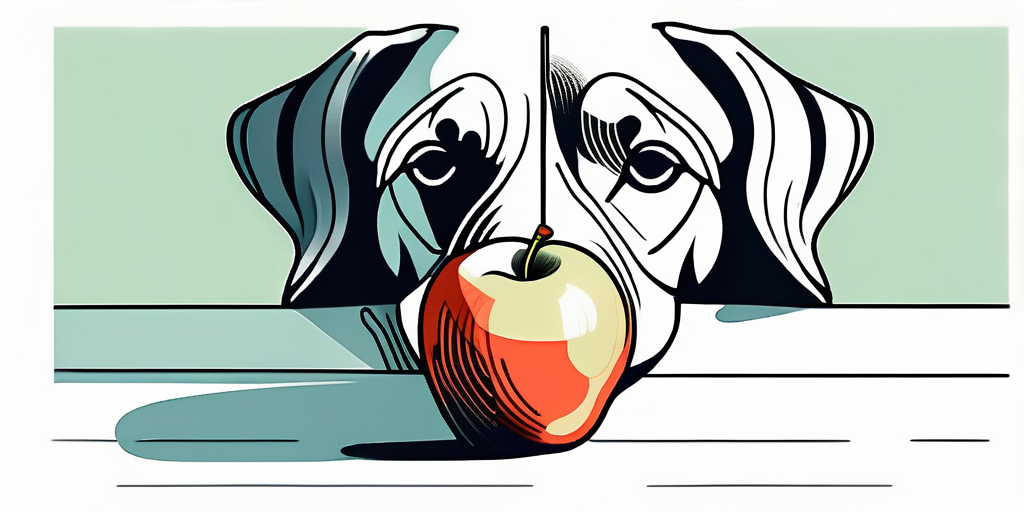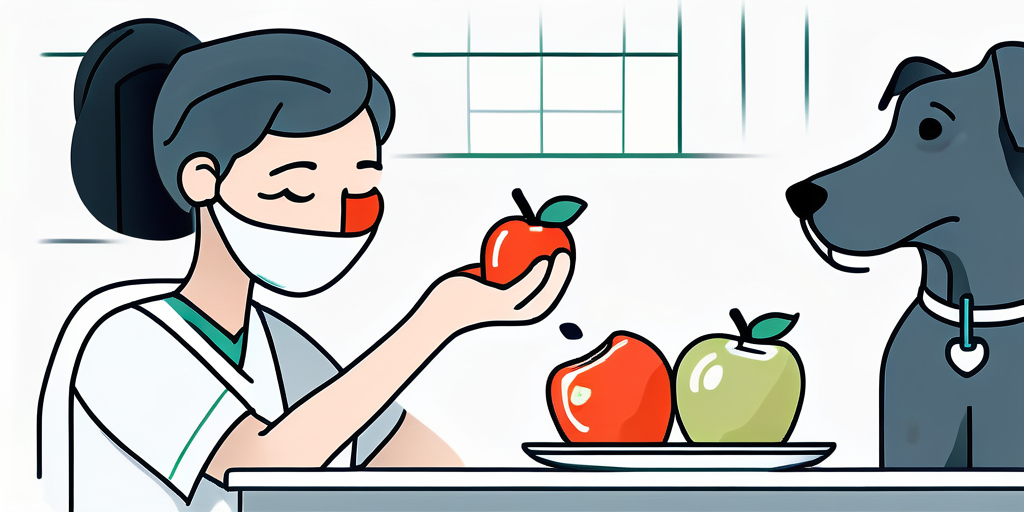There’s no denying that dogs enjoy sharing some of our human food. But when it comes to fruits, are apples a safe option for our furry friends? In this article, we will explore everything you need to know about dogs and apples, including their dietary needs, the nutritional value of apples, the potential risks, and alternatives to consider. So let’s dive in and get the facts straight!
Understanding a Dog’s Dietary Needs
Proper nutrition plays a vital role in maintaining a dog’s overall health and well-being. Dogs require a balanced diet that includes high-quality proteins, fats, carbohydrates, vitamins, and minerals to thrive.

When it comes to feeding our furry friends, it’s important to understand the significance of a balanced diet. A well-balanced diet ensures that dogs receive all the necessary nutrients to support their growth, promote a healthy immune system, and maintain optimal organ function. Just like humans, dogs need a variety of nutrients to stay healthy and energetic.
The Importance of a Balanced Diet for Dogs
A balanced diet for dogs is not just about filling their bellies; it’s about providing them with the right nutrients to thrive. Dogs require proteins to build and repair tissues, fats for energy and a healthy coat, carbohydrates for energy, vitamins for proper functioning of various bodily processes, and minerals for strong bones and teeth.
Without a balanced diet, dogs can suffer from various health issues. Deficiencies in essential nutrients can lead to problems like poor growth, weakened immune system, and even organ dysfunction. On the other hand, an excess of certain nutrients can also be detrimental to their health. For example, an excessive intake of fats can lead to obesity, while too much salt can cause dehydration and kidney problems.
Common Human Foods: Safe or Unsafe for Dogs?
As dog owners, we often find ourselves tempted to share our food with our furry companions. While some human foods can provide health benefits to dogs, it’s crucial to be aware of the ones that can be toxic and pose significant risks.
For instance, certain fruits like apples and blueberries can be a healthy and tasty treat for dogs, packed with vitamins and antioxidants. However, foods like chocolate, grapes, onions, and garlic are highly toxic to dogs and should be strictly avoided. These foods can cause severe health issues, ranging from gastrointestinal problems to organ failure.
It’s essential to educate yourself on what foods are safe and which ones to avoid feeding to your furry companion. Consulting with a veterinarian or doing thorough research can help you make informed decisions about your dog’s diet and ensure their well-being.
The Nutritional Value of Apples
Apples are a popular fruit among humans due to their crisp texture and natural sweetness. They not only make for a tasty snack but also offer several nutritional benefits.
Did you know that apples are not only beneficial for humans but also for our furry friends? That’s right! Dogs can also enjoy the health benefits of this delicious fruit.
Key Nutrients in Apples
Apples are rich in essential nutrients such as fiber, vitamin C, and antioxidants. Fiber aids in digestion and promotes a healthy bowel movement, while vitamin C boosts the immune system and supports collagen production. Antioxidants help protect cells from damage caused by free radicals.
But wait, there’s more! Apples also contain a variety of other nutrients that contribute to their nutritional value. These include potassium, which is essential for maintaining proper heart function and regulating blood pressure, as well as vitamin A, which is important for vision and immune function.
Health Benefits of Apples for Dogs
Feeding apples to your dog in moderation can have some health benefits. The fiber content can aid in maintaining optimal gut health, while the antioxidants help reduce the risk of chronic diseases and provide anti-inflammatory effects.
Additionally, apples can be a great low-calorie treat for dogs who are watching their weight. They offer a satisfying crunch and natural sweetness without adding excessive calories to their diet.
It’s important to note that while apples can be a healthy addition to your dog’s diet, it’s crucial to remove the core and seeds before feeding them to your furry friend. Apple seeds contain a small amount of cyanide, which can be harmful to dogs if ingested in large quantities.
So, the next time you’re enjoying a crisp and juicy apple, consider sharing a slice or two with your four-legged companion. Not only will they love the taste, but they’ll also reap the nutritional benefits that this fruit has to offer.
Can Dogs Safely Eat Apples?
In general, apples are safe for dogs to consume, but certain precautions should be taken.

Did you know that apples are not only a delicious treat for humans, but they can also be a healthy snack for our furry friends? Dogs can enjoy the sweet and crunchy goodness of apples, but it’s important to be aware of a few potential risks and take the necessary steps to ensure their safety.
Potential Risks of Feeding Apples to Dogs
While apples are generally safe for dogs, there are a few things to watch out for. Apple seeds contain small amounts of cyanide, which can be harmful if ingested in large quantities. Therefore, it is crucial to remove the apple core and seeds before offering any apple slices to your dog.
But here’s an interesting fact: the amount of cyanide in apple seeds is so minimal that it would take a large quantity of seeds to pose a real threat to your dog’s health. So, as long as you remove the seeds and core, you can feel confident in sharing some apple slices with your furry companion.
Additionally, some dogs may have sensitivities or allergies to apples. If you notice any unusual symptoms, such as vomiting or diarrhea, after feeding your dog apples, it’s best to consult with your veterinarian. They can help determine if your dog has an intolerance to apples or if there may be another underlying issue.
Proper Ways to Serve Apples to Dogs
If you want to share some apple slices with your dog, it’s best to feed them in moderation and prepare them properly. Wash the apple thoroughly to remove any pesticides or wax. Cut the apple into small, bite-sized pieces, ensuring they are seed-free and easy for your dog to chew and digest.
Now, let’s talk about the apple skin. While it’s perfectly safe for most dogs to consume, some may have trouble digesting it. If you notice that your dog experiences digestive upset or discomfort after eating apple skin, it’s best to peel the apple before serving it to them. This way, you can still provide them with the nutritional benefits of apples without any tummy troubles.
Remember, moderation is key when it comes to feeding your dog apples. While they can be a healthy and tasty addition to their diet, it’s important not to overdo it. Too much of any food, even a healthy one like apples, can upset your dog’s stomach or lead to weight gain.
So, the next time you’re enjoying a crisp apple, consider sharing a few slices with your furry companion. Just remember to remove the seeds, cut the apple into small pieces, and be mindful of any potential sensitivities. Your dog will appreciate the tasty treat, and you can feel good knowing you’re providing them with a safe and nutritious snack.
Vet’s Advice on Dogs Eating Apples
If you have any concerns about your dog’s diet or feeding them apples, it’s always wise to consult with a veterinarian. They can provide personalized advice based on your dog’s specific needs and health conditions.

When to Consult a Vet about Your Dog’s Diet
If your dog has any underlying health conditions, such as diabetes or pancreatitis, it’s essential to consult with a vet before incorporating apples or any new foods into their diet. Certain conditions may require dietary restrictions, and your vet can guide you accordingly.
How Much Apple Can a Dog Eat?
Feeding your dog apples in moderation is key. A few slices as an occasional treat are generally safe for most dogs. However, it is essential to take into account your dog’s size, weight, and overall health when determining the appropriate portion size.
Alternatives to Apples for Dogs
If you’re looking to offer your dog a variety of fruits, there are several safe alternatives to consider.
Other Fruits Dogs Can Eat
Many fruits, such as blueberries, strawberries, and watermelon, can be fed to dogs and provide similar nutritional benefits to apples. Remember to always remove any seeds or pits and offer the fruits in small, bite-sized pieces.
Safe Treats for Dogs
If you’re looking for alternative treats for your furry friend, there are plenty of dog-friendly options available in pet stores. From specially formulated treats to homemade recipes, you can find a wide range of options that are both safe and delicious for your dog.
In conclusion, dogs can safely enjoy apples as part of a balanced diet and a healthy lifestyle. However, it’s crucial to feed them in moderation, remove the core and seeds, and watch out for any allergies or sensitivities. As with any dietary changes, it’s always best to consult with your veterinarian to ensure your dog’s specific needs are met. So go ahead and share some apple slices with your pooch, keeping their health and happiness in mind!
